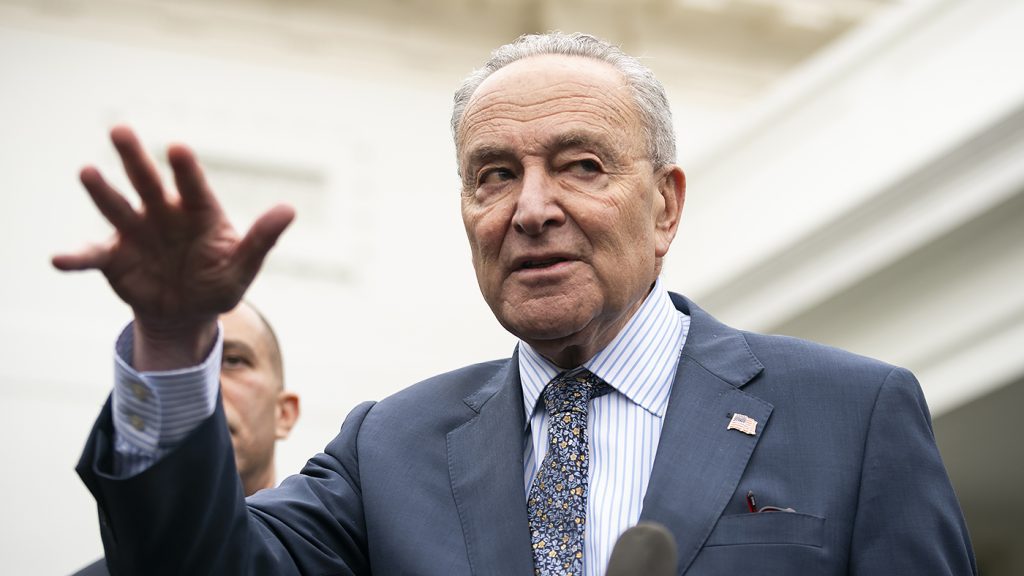On Friday, the Senate voted to push ahead a $460 billion package of six spending bills to finance various federal departments before a looming government shutdown at midnight.
The 63-35 vote revealed a division among Republican senators, with some aiming to avoid a federal government shutdown before a crucial election, and others ready to try delaying the bill with limited time left until a shutdown.
Advancing the legislation sets the stage for a final vote either later on Friday or possibly on Saturday.
Senate Republican Leader Mitch McConnell (Ky.) assured reporters last month that they won't allow a government shutdown to happen.
The legislation is in line with a spending caps deal made between former Speaker Kevin McCarthy (R-Calif.), Senate Majority Leader Chuck Schumer (D-N.Y.), and President Biden last year, and was passed by the House with a 339-85 vote.
Speaker Mike Johnson (R-La.) and Schumer reaffirmed the spending deal, which establishes a $1.659 trillion spending limit and includes $69 billion in adjustments as part of a separate agreement to raise the federal debt limit in 2023.
The package would provide funding for military construction, water development, and various government departments, including Veterans Affairs, Agriculture, Commerce, Justice, Energy, Interior, Transportation, and Housing and Urban Development.
The 1,050-page legislation faced strong opposition from Senate conservatives, including Sens. Rick Scott (R-Fla.), Mike Lee (R-Utah), and Rand Paul (R-Ky.), who raised concerns about over 6,000 earmarks in the bill totaling more than $12 billion.
Scott called for a vote on an amendment to send the bill back to the Senate Appropriations Committee to remove all earmarks.
However, this would have delayed the legislation beyond the March 8 deadline and likely led to a partial shutdown.
Critics of the bill could still filibuster to delay it until Saturday in protest of the earmarks and absence of policy riders addressing border security and other political priorities.
Senate Appropriations Committee Chair Patty Murray (D-Wash.) urged her colleagues not to hold up the bill past the midnight deadline.
“We all know the deadline. We are here in the Senate ready to move quickly in order to avoid a senseless shutdown,” she stated.
Sen. Susan Collins (R-Maine), the vice chair of the Appropriations panel, cautioned that failure to act by midnight would result in a partial government shutdown.
She urged her colleagues to refrain from taking unnecessary risks, in response to conservative members threatening to delay the package in frustration over their inability to amend it.
Democrats highlighted several significant victories in the bill, including full funding for the Special Supplemental Nutrition Program for Women, Infants and Children (WIC), which benefits 7 million women and children across the country.
They also noted funding for the recruitment of new air traffic controllers, rail safety inspectors, and the rejection of proposed cuts to environmental and conservation programs.
Republicans also achieved several policy victories in the package, including a change proposed by Sen. John Kennedy (R-La.) to stop the Department of Veterans Affairs from flagging veterans who need help managing their money to the FBI’s National Instant Criminal Background Check System, which stops them from buying guns.
Sen. Chris Murphy (D-Conn.), the Senate’s top advocate for gun control, said this week he would oppose the bill because of the “terrible new gun policy rider that significantly weakens the firearms background check system.”
Appropriators admitted they had to reduce popular programs because of the stricter spending limits pushed by House Republicans.
“It was a really, really, really difficult budget. Nobody’s going to like our Interior budget because we had to make a lot of cuts,” said Sen. Lisa Murkowski (R-Alaska), the ranking member on the Interior Appropriations Subcommittee.
Friday’s vote reflects a significant achievement for Senate leaders and the chair and ranking member of the Senate Appropriations Committee, Murray and Collins, as it moves half of the annual funding bills closer to the finish line.
Once the current set of funding bills reaches Biden’s desk, senators will concentrate on passing the remaining six appropriations bills funding the Departments of Defense, Labor, Health and Human Services, Homeland Security and other priorities by March 22.
Lawmakers see the second set of funding bills as more challenging to pass, and conservatives are seeking to attach policy additions to block the Pentagon from reimbursing the travel costs of service members who get abortions and to zero out Secretary of Homeland Security Alejandro Mayorkas’s salary.
Congress has had to pass a series of short-term funding bills to continuously delay the funding deadlines since fiscal year 2024 began on Oct. 1.
Schumer and Johnson initially set deadlines of Jan. 19 and Feb. 2 to pass the two tranches of funding bills. Those dates were later postponed to March 1 and March 8 and then pushed back again to March 8 and March 22.
Schumer, McConnell and House Democratic Leader Hakeem Jeffries (N.Y.) pressured Johnson at a White House meeting last week to collaborate with them to avoid a shutdown.
“We made it so clear that we can’t have the shutdown because it hurts so many people in so many different ways,” Schumer told reporters after the Feb. 27 meeting, which Biden and Vice President Kamala Harris also attended.









